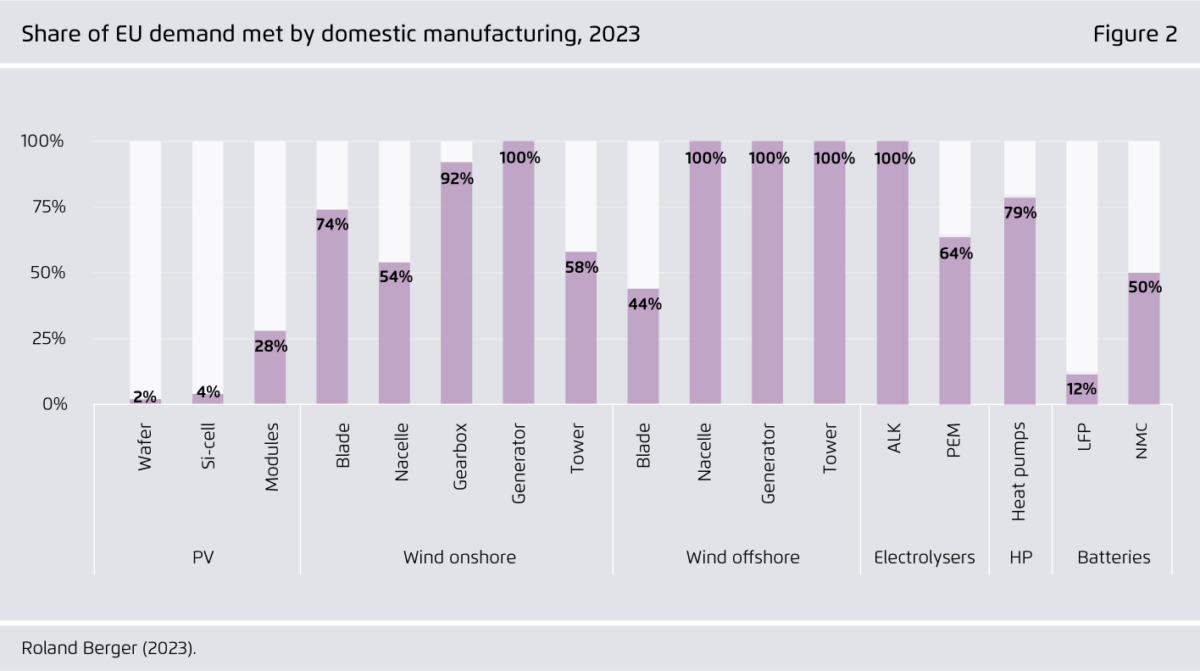Europe depends heavily on imports of clean technologies such as solar photovoltaics or batteries.
“Recent events demonstrate that it would be naive to take the security of supply of critical raw materials, refined materials, components or clean-tech end products for granted,” German think tank Agora Energiewende said in the new “Ensuring resilience in Europe’s energy transition” report.
Europe's transition to climate neutrality requires a rapid increase in solar, onshore wind, offshore wind, batteries, heat pumps, and electrolyzers, said Agora Energiewende. Based on an analysis by Roland Berger, it recommends a package of measures to grow the EU's clean-tech manufacturing industry.
“Greater resilience will come from diversifying supplies through domestic extraction and international strategic partnerships, improving the circularity of materials, and increasing the production of clean technologies in Europe,” the report reads.
The analysis proposes minimum clean technology production quotas in the EU “as insurance against supply chain risks.”
To bring the EU manufacturing industry to these levels, estimates suggest that public financing ranging from €10 billion to €30 billion will be required until 2027 and an additional €32.9 billion to €94.5 billion from 2028 to 2034.
“The technology-specific targets set in the Net Zero Industry Act for batteries, wind and electrolyzers are high and would require more public funding,” said Agora Energiewende.
Popular content
Europe now needs a credible approach to close the production cost gap, reach acritical scale, and develop local supply networks.
“To ensure long-term competitiveness without support, dedicated public funding should be part of a broader policy package including access to finance, competition on quality (including sustainability), a robust pipeline for clean technologies and investments in innovation,” said Agora Energiewende.
It said EU countries should try to attract major clean technology suppliers to establish production in Europe.
“To achieve a gradual derisking of current value chain dependencies, offers of support should however be accompanied by guarantees that ensure a lasting commitment from companies deciding to establish production in Europe,” it said.
Agora Energiewende adds that the European Commission's reform proposal would lead to less aggressive fiscal consolidation in high-debt countries compared to the old rules.
“Unfortunately, the Commission's reform proposal does not sufficiently protect public investments, especially when it comes to a structural and permanent increase in public spending, as in the cases of industrial policy and climate change mitigation,” said Agora Energiewende. “For example, the proposed reform would require Italy to achieve a primary surplus of 2.8% to 3.2% of GDP by 2027, equivalent to a fiscal adjustment of €18 billion to €27 billion.”
This content is protected by copyright and may not be reused. If you want to cooperate with us and would like to reuse some of our content, please contact: editors@pv-magazine.com.


For as long as the ECB mandates synthetically high interest rates – all the talk about investing in EU RES industry is just that – talk. The ECB is following a neo-libtard agenda with respect to high interest rates – good for the banksters & their mates – not so wonder if you want to that the EU’s faltering RES industry going. Pathetic. I note that India follows a somewhat different past with soft loans etc etc to slash the amount of Chinese PV they need to import. EU could do the same, but neither Agora, nor the assorted lobbyists in the Bx village are able to articulate this.